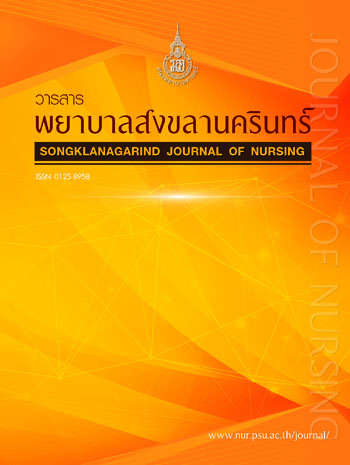A Survey of Aggressive Behaviors and Management of Aggressive Behaviors in Early Childhood by Caregivers in Child Care Centers under Local Administrative Organizations
Main Article Content
Abstract
This descriptive research design aimed to study aggressive behavior and management of aggressive behavior among children 2-5 year of age by caregivers in child care centers, Local Administrative Organizations, Suratthani province. A purposive sample of 237 caregivers working in child care centers was recruited using multi-stage random sampling. Data were collected using survey questionnaires including a personal information sheet, aggressive behaviors in early childhood questionnaire, and management of aggressive behaviors in early childhood questionnaire. These questionnaires were tested for content validity and internal consistency. The aggressive behavior in early childhood questionnaire and management of aggressive behaviors in early childhood questionnaire yielded Cronbach’s alpha coefficients of 0.93 and 0.73 respectively. Data were analyzed using frequencies, percentage, median and interquartile range.
The results revealed that:
1. Overall, caregiver experience of aggressive behaviors among children in the child care centers was low (Md = 16, IQR = 17.0), specifically physical aggression and verbal aggression were low (Md = 11, IQR = 11.0 and Md = 6, IQR = 6.0 respectively). Specifically, the category of physical aggressive behaviors
were also low including self-harm (Md = 1, IQR = 3.0), physical assault towards others (Md = 7, IQR = 6.0), and being destructive towards surrounding (Md = 3, IQR = 4.0).
2. Caregiver management of aggressive behaviors in child care centers revealed that:
2.1 For the management of cultivating desirable behavior, a positive method for management of aggressive behavior was high (Md = 12, IQR = 1.0) and negative method for aggressive behavior was low (Md = 9, IQR = 2.0).
2.2 The management to inhibit aggressive behavior when there was an indication of
impending aggressive behavior was high (Md = 11, IQR = 3.0).
2.3 The management to terminate an aggressive behavior was moderate (Md = 10, IQR = 2.0).
The results of this study show that most caregivers managed aggressive behaviors in early childhood before the child acted which in turn the child was cultivated desirable behavior and reduced the chance to perform aggressive behaviors. Therefore, this information can be provided as baseline for administrator to plan and train caregivers to become aware of the appropriate management of aggressive behavior in early childhood.


